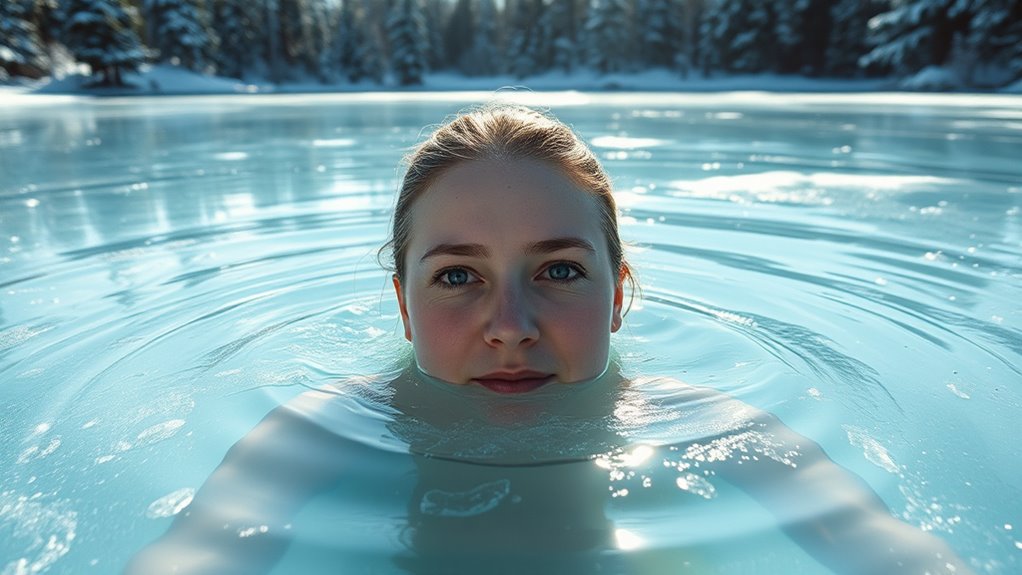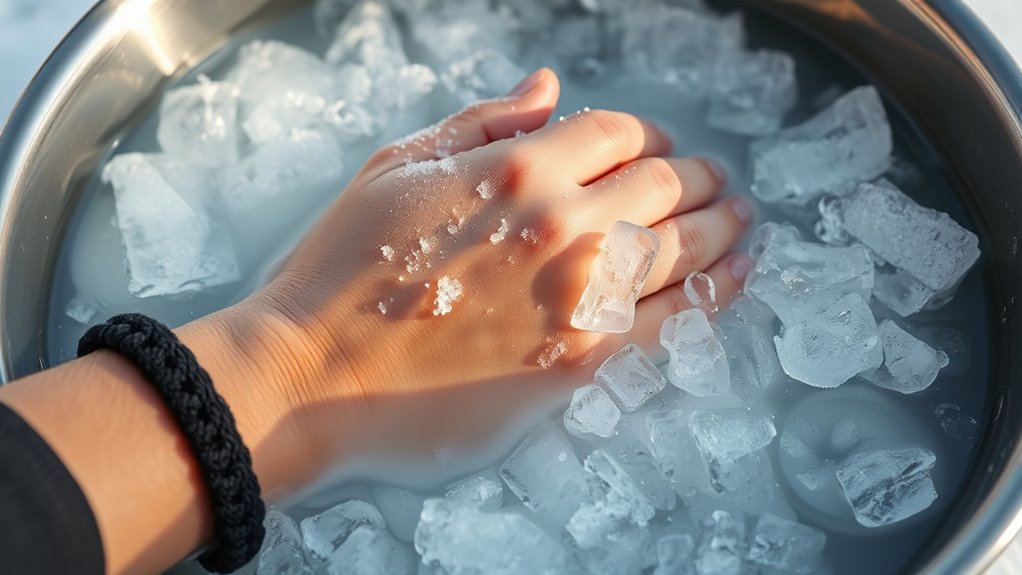Cold immersion activates your vagus nerve, which helps regulate stress, reduce inflammation, and improve mental clarity. This process stimulates the parasympathetic nervous system, promoting relaxation and balancing your overall nervous system. Regular exposure can strengthen your immune response and better manage daily stresses. As you continue exploring, you’ll discover how integrating cold immersion into your routine can boost your resilience and overall well-being.
Key Takeaways
- Cold immersion directly stimulates the vagus nerve, enhancing parasympathetic activity for relaxation and stress reduction.
- Activation of the vagus nerve through cold exposure boosts anti-inflammatory responses and immune regulation.
- Regular cold immersion promotes nervous system balance by reducing stress hormones like cortisol.
- Progressive cold practice trains the vagus nerve, improving resilience to stress and inflammation.
- Incorporating cold immersion into routines supports mental clarity, emotional stability, and overall vagus nerve health.

Cold immersion, a practice gaining popularity for its health benefits, directly stimulates the vagus nerve, a key component of your parasympathetic nervous system. When you submerge yourself in cold water, you’re activating this nerve, which plays a pivotal role in regulating your body’s stress response and immune functions. This stimulation can help you manage stress more effectively by signaling your body to shift from a state of alertness to calmness, promoting relaxation and mental clarity. As a result, cold immersion becomes a powerful tool for reducing anxiety and improving your overall mood, making it easier to handle daily stresses.
Cold immersion activates the vagus nerve, helping to reduce stress and enhance mental clarity.
Beyond mental health, activating the vagus nerve through cold immersion supports your immune system. When your vagus nerve is stimulated, it enhances the production of anti-inflammatory substances and helps regulate immune responses. This means that regular exposure to cold water can potentially lower inflammation levels in your body, making you less susceptible to illness and promoting faster recovery when you do get sick. By strengthening your immune system, cold immersion not only helps prevent disease but also boosts your resilience, allowing you to bounce back more quickly from infections or physical stress.
As you practice cold immersion, you may notice that your ability to stay calm under pressure improves. The activation of your vagus nerve encourages a state of homeostasis, balancing your nervous system and reducing the overproduction of stress hormones like cortisol. This balance is essential for maintaining emotional stability and preventing burnout. Additionally, the cold shock triggers a release of neurotransmitters like norepinephrine, which can sharpen your focus and mood, further reinforcing the stress-reducing effects. The more regularly you expose yourself to cold water, the more your vagus nerve adapts, leading to more profound benefits over time.
It’s important to approach cold immersion gradually, starting with short durations and progressively increasing exposure as your body adapts. Consistency is key to reaping the full benefits, especially for stress reduction and immune enhancement. Remember, it’s not about enduring pain but about creating a controlled stressor that trains your nervous system to respond more resiliently. Incorporating regular practice of cold immersion can help your body develop better resilience to stress and inflammation, enhancing your overall health. Over time, this practice can become a cornerstone of your wellness routine, helping you manage stress more effectively and support your immune health through enhanced vagus nerve activation.

Bubplay Ice Bath Cold Plunge Tub with Cover for Indoor Outdoor for Recovery, Cold Water Therapy, Athletes & Adults -105 Gallons, Black, XL
【XL Full-Body Cold Plunge for Most Adults】 Designed for an immersive ice bath / cold plunge experience with…
As an affiliate, we earn on qualifying purchases.
As an affiliate, we earn on qualifying purchases.
Frequently Asked Questions
Can Cold Immersion Be Safely Performed at Home?
Yes, you can safely perform cold immersion at home if you follow proper home safety and cold exposure techniques. Start with shorter sessions in cold water, gradually increasing exposure as your body adapts. Always have someone nearby in case you need help, and avoid immersing yourself if you have health issues. Listen to your body, and never push beyond your comfort zone to prevent hypothermia or injury.
How Long Should I Stay in Cold Water for Optimal Benefits?
Like a delicate dance with winter’s embrace, you should aim for an ideal timing of 5 to 10 minutes in cold water. Stick to duration guidelines that prioritize safety and effectiveness. Longer stays may risk hypothermia, while shorter ones might not yield full benefits. Listen to your body, gradually increase your time, and remember that consistency is key in harnessing cold’s invigorating power.
Are There Any Age Restrictions for Cold Immersion Practices?
Age considerations are important when it comes to cold immersion practices. If you’re a minor or have underlying health conditions, you should consult a healthcare professional before trying it. Developmental impacts can vary, and younger individuals might be more sensitive to cold exposure. For older adults, it is crucial to start slowly and listen to your body. Always prioritize safety and personalized advice to avoid adverse effects.
How Does Cold Immersion Specifically Stimulate the Vagus Nerve?
Vividly vibrating, cold stimulation directly stimulates your vagus nerve, activating calming signals. When you plunge into cold water, you prompt a reflex that slows your heart rate and relaxes your nervous system. This sensory surge sends signals along the vagus nerve, boosting your body’s ability to balance stress and promote relaxation. Cold immersion, thus, becomes a powerful practice to positively influence your vagus nerve and overall well-being.
What Are Potential Risks or Side Effects of Cold Immersion?
You should be aware that cold immersion can pose risks like hypothermia, especially if you stay in cold water too long or if you’re unprepared. It can also cause cardiovascular effects, such as increased heart rate or blood pressure, which might be dangerous if you have underlying health issues. Always start slowly, monitor your response, and consult a healthcare professional to minimize these risks and enjoy safe cold immersion.

Pulsetto Wellness Wearable with Vagus Nerve Support – Patented Neuro Technology for Relaxation, Stress Balance, Focus, and Restful Sleep
Feel Calm in Minutes – Experience soothing relaxation and renewed balance with quick, 4-10 minute sessions. Pulsetto helps…
As an affiliate, we earn on qualifying purchases.
As an affiliate, we earn on qualifying purchases.
Conclusion
By embracing cold immersion, you activate your vagus nerve, enhance your resilience, and improve your well-being. You push through discomfort, you build your strength, and you release your potential. You embrace the cold, you stimulate your nervous system, and you foster a calmer, more balanced mind. So, take the plunge, feel the change, and experience the benefits. Because in cold immersion, you find clarity, you discover vitality, and you unleash your true self.

The Cold Pod Ice Bath Tub for Athletes with Cover: 88 Gallons Cold Plunge Tub for Recovery, Multiple Layered Portable Ice Bath Plunge Pool
Multiple layered Ice Tub,The Cold Pod cold water therapy tub is engineered from multiple layers of robust, waterproof…
As an affiliate, we earn on qualifying purchases.
As an affiliate, we earn on qualifying purchases.

Dr. Garber's Natural Solutions Immune Boost Health Oral Drops – Gemmotherapy Liquid Supplement to Strengthen Immunity, Support Immune System, Increase Resistance, & Contains Antioxidants – 60ml
SUPERCHARGE YOUR IMMUNITY: Specially formulated to boost immunity, provide antioxidant support, stimulate healthy immune responses & strengthen the…
As an affiliate, we earn on qualifying purchases.
As an affiliate, we earn on qualifying purchases.









